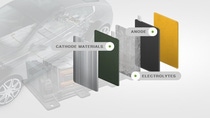Automotive & Transportation
BASF battery materials powering eMobility in North America
The electric vehicle marketing is growing globally, especially in Asia, with annual growth rates nearing 20 percent. Widespread adoption, however, will be dependent on significant advancements in battery technology. Consumers want to feel confident that their electric vehicle will have long range and quick charge capabilities, similar to the conveniences they’ve come to expect from internal combustion engine vehicles. To support the e-mobility market and growing customer demands in North America, BASF expanded its joint venture with TODA in March 2018 to create BASF Toda America LLC (BTA).
Leading BTA is CEO Heiko Urtel who also serves as Business Director for BASF Battery Materials North America. Heiko is responsible for growing BASF’s production capabilities and sales of Cathode Active Materials working closely with customers in North America. In the interview below, Heiko outlines the trends he sees impacting e-mobility and how BASF will continue to be a global leader in battery material development.
How did you get involved with the Battery Materials division at BASF?
I am a chemist and began my career at BASF working in the R&D division in Ludwigshafen, Germany. I’ve held several business positions within the Catalyst division since then.
About two years ago, I was offered a great opportunity to move into Battery Materials, which was exciting then - and now - because this is still an emerging industry. In this role, I took over project responsibilities to evaluate investments in Europe.
When we expanded our collaboration with TODA to create BTA, I was asked to take over business responsibilities for the Battery Materials division in North America.
What are the biggest trends impacting e-mobility adoption?
We can look at three layers impacting the future of e-mobility.
- Global megatrends, such as growing populations and urbanization, mean there is an increasing demand for energy. This influences regions differently. If we look at Asia, especially in China, urbanization increases the traffic in cities and as a result, the air quality suffers. To combat this, there’s a greater emphasis on electric vehicles that reduce air pollution, which contributes to the need for battery technology advancements.
- Improved fuel efficiency and reduced CO2 emissions regulations are also driving e-mobility production. The guidelines outlined by the EU, U.S. Environment Protection Agency and California Air Resources Board have encouraged automakers to add electrified vehicles to their fleet.
- Consumers are further influencing the production of electric vehicles. They want a vehicle that is fun to drive and one that offers a driving experience similar to a combustion engine, such as long range, short charging or filling times and reasonable costs.

Could you share with us the vision of BASF’s Battery Materials division?
BASF is focused on perfecting the battery materials powering today’s electric and hybrid vehicles and developing next-gen technology to meet the anticipated needs of the battery market. We are building plants and forming joint ventures to ensure we have access to the best technology, talent and expertise while increasing production capabilities.
Our goal is to be the preferred supplier of battery materials to the automotive industry in the U.S. and globally. BASF is the first cathode material producer to have a presence in the U.S., expanding our global footprint and bringing us a step ahead of the competition.
With manufacturing facilities in Ohio and Michigan, we’re also closer to our North American customers and members of our supply chain. This proximity is a strategic move, enabling us to meet production capacity needs and closely collaborate to solve industry challenges. Specifically, we are well positioned to help automakers address customer demand by developing battery materials that allow for increased energy density, which has a direct correlation on increased range.
BASF is currently the market leader for Nickel Cobalt Aluminum Oxide cathode materials, and we continue to expand our Nickel Cobalt Manganese capabilities for lithium-ion batteries production.
We plan to use these advantages to drive our innovation and our approach forward in rapidly evolving industry.